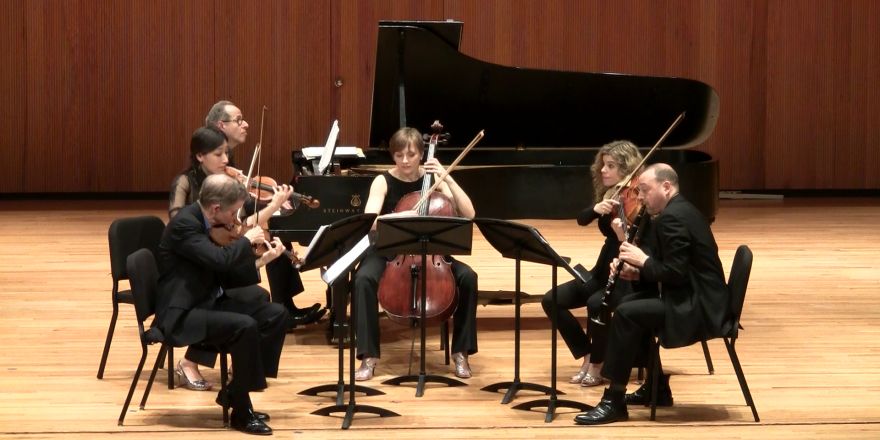Music from Copland House Triumphs
By Lyn Bronson
Music from Copland House closed Chamber Music Monterey’s season yesterday afternoon in a program at Sunset Center that started rather mildly but kept building in intensity until it finally blew us away with a Quintet for Piano and Strings by Lowell Liebermann.
Music from Copland House, consisting of clarinetist Derek Bermel, pianist Michael Boriskin and cellist Wilhelmina Smith, has built a sterling reputation as a repertory ensemble championing American Music. On this occasion they were joined by guest violinists Jesse Mills and Adela Pena plus guest violist Danielle Farina. One has to marvel at the extraordinary artistic quality of these fine musicians, for the playing we heard yesterday was absolutely fabulous.
Opening the program, violinist Jesse Mills and pianist Michael Boriskin performed Copland’s Sonata for Violin and Piano, written in 1943. Although well played by both artists, this piece still emerged as minor Copland that was bland and static without rhythmic or melodic interest until its final movement. Similarly, the second work on the program, “Lullaby for String Quartet” by George Gershwin, a nine-minute work written in 1919 when Gershwin was only twenty-one, has none of the great vitality of his later works, and certainly was only on the program as a curiosity.
The work which ended the first half of the program, however, the Sextet for Clarinet, Piano and Strings by John Musto, was a horse of another color. This was a work that grabbed you by the throat and commanded your attention. It was full of energy, spiky accents, jazzy clarinet playing, and rhythmic vitality. Even in the second movement, marked Tranquillo, so much energy persisted that there was hardly any serenity, but rather a restless sense of tension always below the surface. Clarinetist Bermel was extraordinary throughout — his playing was masterful with great vitality and lots of charm.
After intermission we heard another minor work, Sonata for Clarinet and Piano, by Leonard Bernstein. This was so beautifully performed by clarinetist Bermel and pianist Boriskin that we were won over right from the very intense beginning where the piano part was every bit as absorbing as the clarinet playing. The second movement contained a brief slow interlude before bursting into the jazzy, energetic Bernstein we know so well. From Derek Bermel came some of the most beautiful clarinet playing I have ever heard — his musicianship is as natural as breathing. Pianist Boriskin was absolutely fantastic with his extraordinarily controlled rhythmic sense and his tasteful restraint — he never overplayed or indulged in excess no matter how much sound was called for in the score.
It was the final work on the program, Lowell Liebermann’s Quintet for Piano and Strings, Op. 34 that made the most powerful impression during this concert. In this work, pianist Boriskin went over the top in revealing to us his controlled virtuosity, gorgeous sound, and solid musicianship. The string playing was also absolutely top notch, and in the third movement we heard magnificent playing from cellist Smith and violist Farina. The energy level in the final movement was white hot and totally thrilling.
It is interesting that before the performance of the Liebermann quintet, pianist Boriskin addressed the audience and, in effect, apologized that the musicians would be presenting a work that is essentially romantic and backward looking, rather than avant-garde. I tried to imagine a situation where a professor might address an English class at Harvard, and begin by apologizing, “the novel you are about to read was written very recently, but it doesn’t contain any experimental devices such as confusing past, present and future, it doesn’t contain ideas scrambled in free association, it doesn’t use bizarre spelling and punctuation, etc., etc.” Most likely this would not happen, and the novel would be presented as an honest expression of someone’s creative output.
However, Mr. Boriskin, like many contemporary musicians feels a great obligation to perform new works. We have endured almost a hundred years of experimentation in alternatives to conventional, traditional music. We have lived through 12-tone serial techniques, Sprach Stimme, neo-classicism, neo-romanticism, Musique Concrete, new scales, new harmonic language, electronically created music, neo-Dadaism, minimalism and “Music of the Absurd.” The public didn’t buy it, for it realized that experimentation is fine, but it must not become an end in itself. And, ironically, many thousands of composers attempted to be different and ended up sounding alike. So along comes Mr. Liebermann and does indeed look backward, but what he puts together is also very effective since it engages our attention and our feelings. So, Mr. Liebermann is like the new novelist, not trying to be avant-garde, but creating something of value, not because it is new, but because it is good.
Bravo to Mr. Liebermann, and bravo to Music from Copland House for performing one of his significant works yesterday afternoon.



